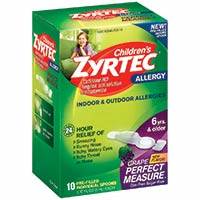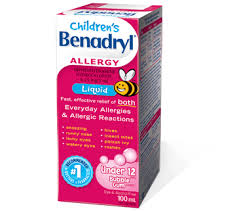Allergic reactions are common among children. If your child suddenly has fits of sneezing and starts having a runny nose, watery eyes and itchy rashes, she may be having an allergic reaction to something in the air or something she ate. These symptoms are the result of a chemical the body releases, which is called histamine. Doctors therefore often prescribe an antihistamine medication to treat children’s allergies. Medications to relieve allergic reactions often contain an antihistamine.
Best Allergy Medicine for Kids--OTC
Since allergic reactions are common among children, parents often want to know what is the best allergy medicine that is available over the counter. In a survey of several pharmacists, the U.S. News lists the results of the best allergy medicine for kids:
1. Children's Claritin
 This allergy medicine contains an antihistamine and comes in chewable tablets. It blocks the action of histamine and helps decrease allergic symptoms. Ask your doctor or pharmacist how to use Claritin chewable tablets or check the medicine label for dosing instructions. Do not give your child more than the recommended dose.
This allergy medicine contains an antihistamine and comes in chewable tablets. It blocks the action of histamine and helps decrease allergic symptoms. Ask your doctor or pharmacist how to use Claritin chewable tablets or check the medicine label for dosing instructions. Do not give your child more than the recommended dose.
Children's Claritin tablets must be taken by mouth and chewed, with or without food. Instruct your child to chew it completely before swallowing. Be careful, however, not to give it to your child if he/she is below two years old, without asking your doctor first.
Note: If your child is scheduled for a skin test for allergies, do not give him Children's Claritin Allergy tablets without asking our doctor, since these may interfere with the results of the test.
2. Children's Zyrtec Allergy Syrup
 This is also one of thebest allergy medicines for kids because it contains an antihistamine called cetirizine. It is used to prevent or treat symptoms of allergy, including itchy skin rashes and hives.
This is also one of thebest allergy medicines for kids because it contains an antihistamine called cetirizine. It is used to prevent or treat symptoms of allergy, including itchy skin rashes and hives.
Zyrtec is to be taken by mouth, as indicated in the label. The syrup must be measured using a specially marked measuring spoon/container to ensure accuracy. It may be taken with or without food. Use it only as directed. Because it is in syrup form, it may be used in children as young as six months.
Usual doses are as follows:
For children ages 2 to below 6 years: 1/2 teaspoon or 2.5 mL once a day. The dose may be increased to a maximum of 1 teaspoon or 5 mL once a day, or to ½ teaspoon (2.5 mL) twice daily. Do not give your child more than this dose in 24 hours.
For children ages 6 years or above: 1 to 2 teaspoons or 5 to 10 mL once daily. Do not allow your child to take more than 2 teaspoons (10 mL) within 24 hours.
Ask your doctor’s advice about using this medication if your child is younger than two years old.
Report any of these side effects to your health care provider, such as:
- allergic reactions to the drug, including like rash, itching, hives, facial swelling -changes in hearing/vision
- high blood pressure
- fast heartbeat
- infection
- changes in urinary habits
Some side effects usually get better on their own and do not require treatment unless they do not improve, such as:
- loss of sleep
- irritability
- stomach pain
- sore throat
- swelling
3. Children's Benadryl
 Another one of the best allergy medicine for kids, Benadryl contains diphenhydramine, an antihistamine that is effective in relieving symptoms of allergy, hay fever and colds. These include watery eyes, rash, itching, itchy eyes/throat/nose, runny nose, cough, and sneezing. Aside from these, it can also prevent or treat dizziness, nausea, and vomiting due to motion sickness. In addition, diphenhydramine helps your child to fall asleep.
Another one of the best allergy medicine for kids, Benadryl contains diphenhydramine, an antihistamine that is effective in relieving symptoms of allergy, hay fever and colds. These include watery eyes, rash, itching, itchy eyes/throat/nose, runny nose, cough, and sneezing. Aside from these, it can also prevent or treat dizziness, nausea, and vomiting due to motion sickness. In addition, diphenhydramine helps your child to fall asleep.
Aside from blocking histamine, diphenhydramine blocks another natural substance called acetylcholine, which helps dry up runny nose and watery eyes.
Side effects may include dizziness, drowsiness, stomach upset, constipation, blurred vision, dry mouth/throat/nose.
Caution: do not use to treat cold symptoms in kids younger than 6 years old
4. Allegra
 Allegra contains fexofenadine, an antihistamine that relieves allergy symptoms. If you are using this OTC product for the first time, ask your pharmacist about it or read the instructions provided in the medicine label.
Allegra contains fexofenadine, an antihistamine that relieves allergy symptoms. If you are using this OTC product for the first time, ask your pharmacist about it or read the instructions provided in the medicine label.
If using the liquid preparation, shake the bottle and measure one dose carefully with a special measuring spoon. Swallow with water, not juice or other liquids. If taking the tablet form, it is best taken on an empty stomach. It is also advisable to let the tablet dissolve on the tongue and swallow, with/without water.
Side effects of this drug include fever, cough and stomach upset. These may improve without treatment, but tell your doctor if these persist. Get medical attention right away if symptoms of serious allergic reaction occur, such as rashes, itching, swelling of the face, tongue, or throat, trouble breathing or severe dizziness.
More Allergy Medicine for Kids
There is not only one best allergy medicine for kids, but there are a number of them which have been found effective and safe, such as:
Prescription antihistamines:
- Azelastine (Astelin, Astepro) nasal spray
- Hydroxyzine (Atarax, Vistaril )
- Desloratadine (Clarinex)
Eyedrops (for kids above 3 years):
- Olopatadine HCL (Pataday)
- Olopatadine HCL (Patanol )
- Azelastine (Optivar)
- Ketotifen fumarate (Zaditor)
Basics to Know About Allergy Medicine for Kids
- Some antihistamines are short-acting and can be taken every 4-6 hours.
- Long-acting time-release antihistamines are usually taken every 12- 24 hours.
- Some medications are a combination of an antihistamine plus a decongestant.
- Common side effects include dry mouth and drowsiness.
- Most experts believe that antihistamines must be taken before symptoms appear.
- Ask a pediatrician if you should give your child allergy medicine:
When Should Kids Take Antihistamines?
- Before bed, to control morning symptoms, which are often worse between 4 to 6 am
- Before the allergy season sets in, especially if your child is sensitive to pollen.
- All the time, for children who have allergies all year-round
